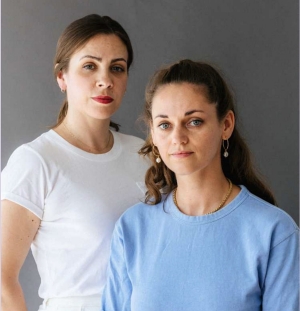Katie Nolan, BFA 10, remembers a critical decision she made during her time at Concordia’s Department of Theatre: she had originally applied for the performance stream but had a slight change of heart the day of her audition.
“It felt more interesting to me to be able to touch on all other aspects of theatre — design, management, curation, creation,” Nolan recalls. “So I pivoted to a theatre major. It was a little bit of foreshadowing for my eventual career.”
That openness to exploring different paths continued beyond Concordia and into her professional life.
Nowadays, Nolan is a producer at Babe Nation Films, a company she co-founded with Lindsay Tapscott that proudly champions underrepresented voices.
“We want to build the next generation of female and emerging storytellers,” she explains.
“We think pretty outside the box when it comes to our talent chasing. Durga Chew-Bose, the director and writer of our latest film, Bonjour Tristesse, had never written a screenplay or been on a set before. But we loved her collection of essays and became obsessed with the idea that she write an adaptation of the novel.”
The assignment was more than understood — the film premiered and generated buzz at the Toronto International Film Festival in 2024 — and Nolan and Tapscott are now producing Chew-Bose’s next two screenplays.
Bringing Bonjour Tristesse to the screen
Starring Chloë Sevigny, Bonjour Tristesse is about a teenager trying to come to terms with womanhood and freedom. Although it took almost a decade to bring to the screen, that didn’t stop Nolan and Tapscott.
“We just loved the book so much and felt a closeness to [playwright and novelist] Françoise Sagan even though we had never known her. It felt like she was a woman ahead of her time, and that the first adaptation of the book didn’t do justice to the female experience.
“It felt necessary to us to take another run at it, especially with a fresh, female perspective, a female director.”
That kind of persistence has become part of Nolan’s producing philosophy — and, she notes, putting these types of stories on the screen is more possible than ever before.
“It’s definitely changing. Perhaps not as quickly as we would like, but there has been encouraging movement forwards. We also try our best to forge our own path and not necessarily use any one template from past producers — be they male or female.”
Babe Nation follows its own ethos, she adds, one that emphasizes inclusive hiring, putting as many women on set as possible, providing childcare for key creatives when needed and fostering a warm, collaborative environment where real life is allowed to fold naturally into set life.
So where does Nolan envision Babe Nation Films in the next several years?
“Ideally we would have a team to support us, an office in Los Angeles and perhaps Paris, a thriving television slate, and a small but curated slate of films with directors we’ve worked with over and over.
“That would be a dream.”


 Producers Lindsay Tapscott and Katie Nolan, BFA 10 (right)
Producers Lindsay Tapscott and Katie Nolan, BFA 10 (right)